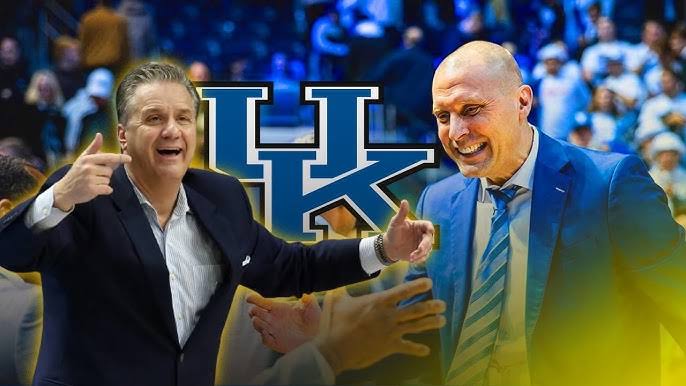In recent months, Mark Pope, the head coach of the University of Utah’s men’s basketball team, has been the subject of intense scrutiny following accusations involving John Calipari, the prominent head coach of the University of Kentucky. The accusations suggest that Calipari may have helped Pope in an effort to build a competitive roster, which, if proven, could violate NCAA rules regarding recruitment and recruiting violations. However, instead of rushing to criticize Pope for his association with Calipari, it’s important to take a more nuanced perspective on the matter and recognize why he shouldn’t be loathed for the situation at hand.
1. Coaching Relationships Aren’t Unusual in College Basketball
The world of college basketball coaching is deeply interconnected, with coaches frequently working together, sharing strategies, and mentoring one another. John Calipari is a well-respected figure in the sport, known for his ability to bring in top-tier talent and consistently build competitive programs. For Pope, as a young and relatively newer coach at Utah, seeking advice from an experienced and successful coach like Calipari is not just normal—it’s smart.
Building a program requires learning from those who have had success at the highest levels. This doesn’t necessarily indicate that Pope was circumventing NCAA rules or engaging in illicit activity. Coaches learn from each other, trade insights, and sometimes even share resources in ways that are entirely permissible under NCAA guidelines.
It’s essential to recognize that while the accusations may seem suspicious to outsiders, the fact that Pope turned to a fellow coach for advice or guidance doesn’t automatically equate to wrongdoing. In fact, Pope’s behavior aligns with the collaborative nature of coaching in college basketball.
2. No Direct Evidence of Wrongdoing
As of now, the accusations against Pope and Calipari are just that—accusations. There’s no direct evidence that either coach engaged in activity that violated NCAA rules. In the world of college sports, rumors and allegations can easily swirl, especially when high-profile figures like Calipari are involved. However, it’s critical to remember that accusations alone don’t make someone guilty.
Pope has stated that he isn’t focusing on the allegations and is instead concentrating on building a competitive and clean program at Utah. His focus should be on coaching his team, preparing them for competition, and nurturing their development, rather than becoming embroiled in unproven rumors.
3. Pope’s Own Track Record of Integrity
Mark Pope is no stranger to coaching excellence. Prior to taking the helm at Utah, he built a strong reputation at BYU, where he turned around a struggling program and led them to postseason success. His success at BYU was based on sound coaching, discipline, and recruitment strategies that were within the bounds of NCAA regulations.
Pope’s reputation for integrity has been a cornerstone of his coaching career. If the accusations were valid, it would be out of character for Pope to risk tarnishing the reputation he has worked hard to build. He has consistently demonstrated that his focus is on developing players both on and off the court, which is why it’s hard to believe that he would jeopardize his career with illegal recruitment practices.
4. The Reality of College Basketball Recruiting
Recruiting in college basketball is a complex, high-pressure process where coaches are constantly under the microscope. Coaches often face challenges related to compliance with NCAA rules, and occasionally, accusations or misunderstandings arise due to the fast-paced, high-stakes nature of the sport. Sometimes, relationships between coaches and players can get misinterpreted, or actions may be taken that were not intended to violate the rules.
It’s important to acknowledge that even if Pope did receive advice from Calipari or others, it doesn’t automatically imply foul play. College basketball is a highly competitive arena, and coaches at all levels lean on each other for support and information. The key here is whether Pope’s actions broke any actual rules, and as of now, there is no conclusive proof to suggest that he did.
5. He Deserves the Benefit of the Doubt
Until there is clear evidence showing Mark Pope engaged in unethical or illegal practices, he should be afforded the benefit of the doubt. Jumping to conclusions based on accusations alone is an unfair way to treat any individual, especially someone who has worked hard to build a program based on integrity.
Mark Pope’s focus remains on developing a team that competes at a high level, and that’s where the focus should stay. The allegations surrounding his relationship with Calipari shouldn’t overshadow his work as a coach, nor should they dictate the narrative of his career.
Conclusion
While the NCAA accusations regarding Mark Pope and John Calipari might cause some controversy, it’s important not to demonize Pope based on assumptions alone. The college basketball coaching community is filled with collaboration and shared experiences, and Pope’s reputation for integrity and success should not be overshadowed by unfounded claims. Until more concrete evidence emerges, Pope deserves to be seen as a coach focused on building a clean, competitive program at Utah, and not as someone involved in any wrongdoing.


